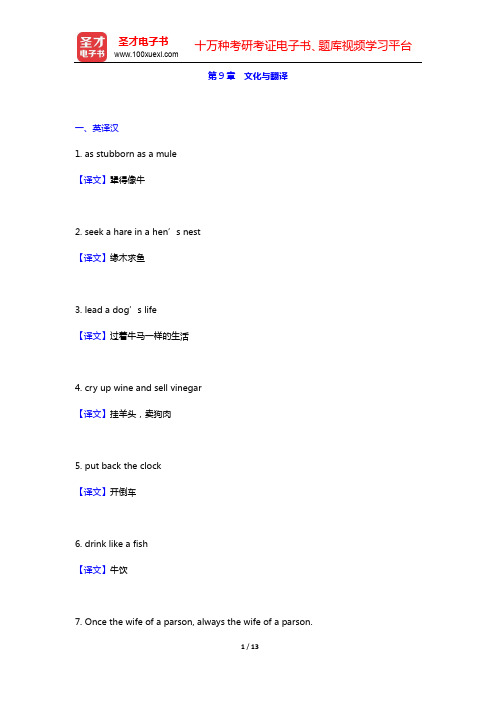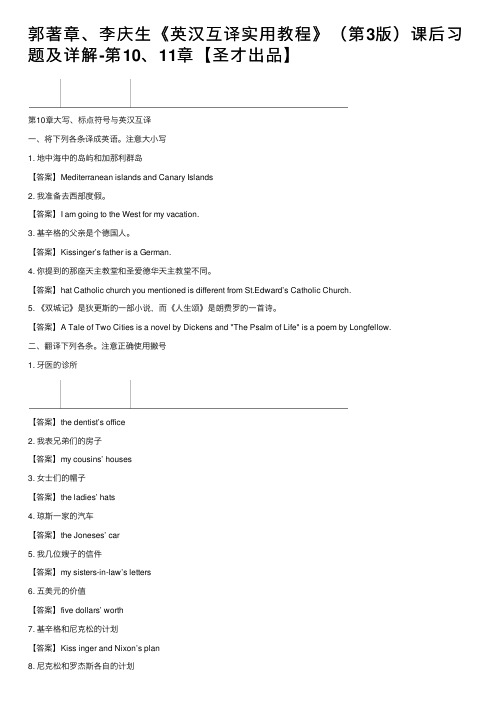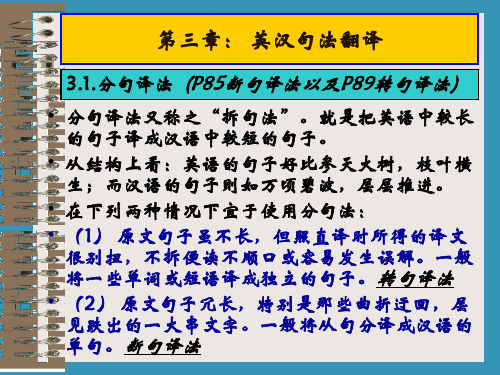英汉汉英实用翻译教程
[文学]英汉翻译实用教程第2讲_英译汉_1
![[文学]英汉翻译实用教程第2讲_英译汉_1](https://img.taocdn.com/s3/m/aa4f0353a417866fb84a8e8d.png)
3. 改换说法
• 在翻译时,在译清原文的确切含义的基础上,按 译语的搭配习惯,选择恰当的译语词汇对原文加 以引申,并可以改变原文的结构和句式,译文只 要忠实原文、通顺流畅即可。例如: • 1. During the first part of his life, Lincoln was a storekeeper and postmaster. • 林肯早年当过店主和邮政局长。 • 2. A network of highways was built from coast to coast. • 横跨大陆建筑了一个公路网。
2019/2/24 12
• 6. The alternating current does not know such a disadvantage as the direct current does. • 死译:交流电不知道直流电的这种缺点。 • 引伸:交流电不存在直流电的这种缺点。 • 7. If iron is kept moist, rusting is rapid, which might lead us to think that water was the influence causing the corrosion. • 死译:如果保持潮湿,生锈就快,这可能使我们 以为水是引起腐独的影响。 • 引伸:如果保持潮湿,生锈就快,这可能使我们 以为水是引起腐独的原因。
2019/2/24 15
• 而对于那些本身似为中性的词汇,我们必须根据上下文判 断其褒贬而做出适应的表达。例如: • 1)He is a well-known professor … • 文明遐迩…。(褒义) • 2)He is a well-known criminal … • 臭名远洋… 。(贬义) • 3) John was an aggressive salesman who did his job quite well. • 约翰是个积极肯干的推销员,他工作干得很出色。(褒义) • 4) Hitler pursued an aggressive policy after he seized power. • 希特勒夺取了政权之后就推行侵略政策。(贬义)
英汉汉英翻译教程参考译文

第6课The Miao Dragon Boat Festival (II)The Miao Dragon Boat Festival is different from / differs from the Hans’ / that of the Hans / the Han celebration. Apart from / Besides / In addition to a different date of celebration from that of the Hans’ (which takes place / happens / is celebrated on the fifth day of the fifth lunar month) , it generally does not include a dragon boat race, but (it) chiefly (includes) visits to friends and relatives in other villages instead. The dragon boat begins its voyage along the river early in the morning / in the early morning, and is received by friends and relatives wherever / at any place where it stops / arrives.When it approaches / comes near a village, an iron blaster is set off to announce its arrival / inform friends and relatives (of its arrival). Villagers on the bank respond with firecrackers / set off firecrackers in response and come to meet it. The hosts present two cups of rice wine to each oarsman / present each oarsman with two cups of rice wine and then tie / fasten gifts—ducks, geese, and colored silks—(on) to the head of the dragon. Gifts for close relatives, like / such as sons-in-law or cousins, are pigs or goats.At about 4 p.m. the boat stops alongside the river bank. The people on the boat eat, with their fingers / without using bowls and chopsticks, meat and glutinous rice balls (which are) placed on the sides of the boat. Women and children on the bank come to “beg”the boatmen for food. Legend had it that if one ate food from a dragon boat, he would be free from disaster and have all his wishes fulfilled, / eating food from a dragon boat would protect one from disaster and fulfill all one’s wishes, which / and that later became a tradition / traditional custom.On the banks of the river are also held / there are also the Miaos’traditional horse races, bullfights and drum dances. Girls in holiday clothes / holiday attire / holiday array / their holiday best dance to (the accompaniment of) (log) drums / (log) drum beats. Young men and women sing antiphonally all through the festival nights; they get to know each other / get acquainted with each other thereby, and often get married / become man and wife later.第7课大本钟大本钟是伦敦最有名的地标之一,也是世界上最大的四钟面时钟之一。
郭著章《英汉互译实用教程》(第4版)教材配套题库-第9章 文化与翻译【圣才出品】

第9章文化与翻译一、英译汉1. as stubborn as a mule【译文】犟得像牛2. seek a hare in a hen’s nest【译文】缘木求鱼3. lead a dog’s life【译文】过着牛马一样的生活4. cry up wine and sell vinegar【译文】挂羊头,卖狗肉5. put back the clock【译文】开倒车6. drink like a fish【译文】牛饮7. Once the wife of a parson, always the wife of a parson.【译文】嫁鸡随鸡,嫁狗随狗。
8. —“Until her husband won the pools, she was the most commonplace, dowdy, illiterate creature imaginable, but now that she dresses herself up like a society queen and nearly always remembers to sound her aitches, people are already beginning to forget what she was like before.”—“Fine feathers make fine birds.”【译文】——“过去没有比她更平平常常、无知无识而又邋邋遢遢的了,自从她男人赢得全部赌注以后,她打扮得象个社交皇后,总是记住发H的音,人们开始忘记她以前是什么样子了。
”——“人靠衣裳马靠鞍嘛。
”9. I’d much rather see her once or twice and not do anything about it---what could I do about it anyway? She’s a bit out of my class, don’t you think? If I did try to do anything, I’d only get sent off with a flea in my ear.【译文】我宁愿见她一两面就算了──我还能干什么呢?你没看到她和我不怎么相称吗?我要干点什么,也只会碰一鼻子灰。
郭著章、李庆生《英汉互译实用教程》(第3版)课后习题及详解-第10、11章【圣才出品】

郭著章、李庆⽣《英汉互译实⽤教程》(第3版)课后习题及详解-第10、11章【圣才出品】第10章⼤写、标点符号与英汉互译⼀、将下列各条译成英语。
注意⼤⼩写1. 地中海中的岛屿和加那利群岛【答案】Mediterranean islands and Canary Islands2. 我准备去西部度假。
【答案】I am going to the West for my vacation.3. 基⾟格的⽗亲是个德国⼈。
【答案】Kissinger’s father is a German.4. 你提到的那座天主教堂和圣爱德华天主教堂不同。
【答案】hat Catholic church you mentioned is different from St.Edward’s Catholic Church.5. 《双城记》是狄更斯的⼀部⼩说,⽽《⼈⽣颂》是朗费罗的⼀⾸诗。
【答案】A Tale of Two Cities is a novel by Dickens and "The Psalm of Life" is a poem by Longfellow.⼆、翻译下列各条。
注意正确使⽤撇号1. ⽛医的诊所【答案】the dentist’s office2. 我表兄弟们的房⼦【答案】my cousins’ houses3. ⼥⼠们的帽⼦【答案】the ladies’ hats4. 琼斯⼀家的汽车【答案】the Joneses’ car5. 我⼏位嫂⼦的信件【答案】my sisters-in-law’s letters6. 五美元的价值【答案】five dollars’ worth7. 基⾟格和尼克松的计划【答案】Kiss inger and Nixon’s plan8. 尼克松和罗杰斯各⾃的计划【答案】Nixon’s and Rogers’s plans三、将下列句⼦译成汉语。
注意标点符号的使⽤1. The teacher said. “I will accept your excuse.”【答案】这位⽼师说:“我同意你的请假。
实用翻译教程(2)

• • • •
• • • •
Their power increased with their number. 他们人数增加了,力量也随之增强。 (并列分句) I found the house suddenly, and stood there with my heart beating fast and tears coming to my eyes. (并列分句) 我突然找到那所房子。 我站在那里,心剧 烈地跳着,泪水也涌上眼睛。 We cannot see it clearly for the fog. 由于有雾,我们看不清它。 (译成原因分句)
• 男人们很聪明,他们不会上时装设计师的当。
• 4 . Energy can neither be created nor destroyed, a universally accepted law. • 能量既不能被创造也不能被消灭,这是一 条公认的规律。 (名词短语) • 5 . The night was chilly—it was early November. A light drizzle added to my discomfort . • 夜里冷风飕飕,那是 十一月初,天下起 了毛毛细雨,令我倍加难受。
• 她可以谅解地为自己高超的烹调技艺感到自豪。 • 她自夸她高超的烹调技艺,这是情有可原的。
• 2. The ancients tried unsuccessfully to explain how a rainbow is formed.
• 古人曾试图说明彩虹是怎样产生的,但没 有成功。
• 3. Chairman Mao might have spoken with understandable pride of his policy of “selfreliance.”
汉英互译实用基础教程

实用基础教程汉译英教程:本教程旨在帮助学习者掌握汉译英的基本技巧和策略,提高英语表达能力。
我们将通过讲解常用词汇和句型,分析翻译实例,并提供练习题,帮助学习者在实际操作中提高翻译能力。
English Translation Tutorial:This tutorial aims to help learners master the basic techniques and strategies of English translation, and improve their English expression skills. We will explain commonly used vocabulary and sentence patterns, analyze translation examples, and provide practice exercises to help learners improve their translation abilities in practical situations.翻译实践汉译英实践:将一段中文文本翻译成英语。
我们将提供一段简单的中文文本,学习者可以根据教程中的技巧和策略进行翻译,并在完成后与参考译文进行对比,找出自己的不足之处。
English Practice Translation:English-Chinese Translation Practice: Provide a simple Chinese text and learners can translate it into English according to the techniques and strategies taught in the tutorial. After completing the translation, they can compare their translation with the reference translation to identify areas for improvement.英译汉实践:将一段英语文本翻译成中文。
郭著章、李庆生《英汉互译实用教程》(第3版)课后习题及详解-第3、4章【圣才出品】
郭著章、李庆⽣《英汉互译实⽤教程》(第3版)课后习题及详解-第3、4章【圣才出品】第3章翻译常⽤的⼋种技巧⼀、翻译下列各段。
注意翻译术语的适当运⽤,尤其是有关翻译技巧的定义1. There are in the main eight techniques and principles in translation, either from English into Chinese or from Chinese into English. They are: diction, amplification, omission, conversion, inversion, negation, division and repetition.【答案】不管是英译汉还是汉译英,主要有⼋条翻译技巧(和原则),即选词⽤字法,增译法,减译法,词类转移法,词序调整法,正说反译法、反说正译法,分译法和重译法。
2. By “diction” we mean proper “choice of words” in translation on the bas is of accurate comprehension of the original.【答案】所谓“选词⽤字法”,就是在正确理解原⽂的基础上适当地选择词语。
3. Repetition is useful chiefly for clearness, which is of course the first quality to be acquired in a discourse. Secondly, words are repeated also for the sake of emphasis or force, which is another important quality in expression. Lastly, repetition will give life to the discourse and make it more attractive.【答案】重译法之所以有⽤,第⼀是它可使译⽂明确(明确是衡量语⾔质量的第⼀个标准);第⼆是为了强调,使语⾔有⼒(这是衡量语⾔质量的另⼀重要标准);第三是为了使译⽂⽣动形象,引⼈⼈胜。
翻译新概念英汉互译实用教程
Байду номын сангаас
第三章 英译汉实用指南
•
第一节 英语理解中的难点及翻译对策 第二节 英译汉表达中的四对关系 第三节 英语名词的译法 第四节 英语修饰语的译法 第五节 英语“三态”、“一气的译法” 第六节 英语三大从句的译法 第七节 英语特殊句型的翻译 第八节 英语长句的翻译 第九节 英语习语、典故的翻译
第五章 英语应试翻译题常见结构及 译技指导
• 第一节 英译汉译技指导 第二节 汉译英译技指导 附录各章练习参考答案
第四章 汉译英实用指南
•
第一节 怎样才能译出地道的英语 第二节 汉译英表达五戒 第三节 汉译英主干及信息重心的确立 第四节 汉语词语的翻译 第五节 汉语的基本句型及其翻译 第六节 汉译英语篇重组 第七节 汉语习语和文章标题的翻译 第八节 汉译英典型错误透析
第一章 翻译概论
第一节 翻译的作用与使命 第二节 翻译标准 第三节 直译与意译 第四节 “归化与“异化译法” 第五节 “可译性”和“不可译性的补 偿” 第六节 “翻译症的症状及克服方略”
第二章 英、汉语言对比及互译对策
•
第一节 英、汉语言的共相 第二节 英、汉语言的差异 第三节 英、汉互译的常用技巧
郭著章、李庆生《英汉互译实用教程》(第3版)课后习题及详解-第1、2章【圣才出品】
第1章翻译概述一、填空1. Yan Fu’s 3-word translation criteria are _____, _____and_____.【答案】faithfulness, expressiveness, elegance【解析】严复提出的翻译标准:信、达、雅。
2. Translation in China has a long history of some_____years.【答案】two thousand【解析】我国的翻译事业有约2000年的历史。
3. The two words used as the common criteria of translation in China today are _____and_____.【答案】faithfulness, smoothness【解析】我国现今通用的两个翻译标准:“信”和“达”。
二、回答下列问题1. What is meant by translation?【答案】Translation is a representation or recreation in one language of what is written or said in another language, not only an art but also a science.2. What was Karl Marx fond of saying about the importance of a foreign language?【答案】Karl Marx was fond of saying: “A foreign language is a weapon in the struggle of life.”3. What are the prerequisites for a qualified translator?【答案】Generally speaking, a qualified translator should have five prerequisites:① a good command of the source language,② a good command of the target language,③ a wide range and scope of knowledge,④ a high political consciousness,⑤ a necessary knowledge of basic techniques used in translation.4. How to define the literal translation and the liberal translation?【答案】Literal translation refers to an adequate representation of the original almost without any change of word-order or sentence construction. Liberal translation is also called free translation, which does not adhere strictly to the form or word-order of the original.5. What do you think should be the criteria of translation?【答案】To me, the criteria of translation should be the following two words: faithfulness and smoothness, or even only one word: faithfulness.三、英译汉1. Source language and target language【答案】译出语和译入语2. the Oriental and Occidental languages 【答案】东方语言和西方语言3. Alexander Fraser Tyler【答案】亚历山大•弗雷泽•泰勒4. Georges Mounin【答案】乔治•穆南5. Feedorov【答案】费道罗夫6. Indu Dharmarakcha【答案】竺法护7. Kumara’3iva【答案】鸠摩罗什8. Paramartha(Gunarata)【答案】真谛/波罗末陀(拘那罗陀)【答案】利玛窦10. Euclid’s Elements【答案】《几何原本》11. La Dame aux Camelias【答案】《茶花女》12. A History of Politics(by E. Jenks)【答案】《社会通诠》(甄克思著)13. On Liberty(by J. S. Mill)【答案】《群己权界论》(约翰•穆勒著)14. An Inquiry Into the Nature and Cause of the Wealth of Nations(by A.Smith) 【答案】原富》(亚当•斯密)15. Evolution and Ethics and Other Essays(by T. H. Huxley)【答案】《天演论》(赫胥黎)四、汉译英【答案】faithfulness, expressiveness and elegance2. “宁顺而不信。
英汉互译实用教程(一)
英汉互译实用教程(一)英汉互译实用教程1. 简介该教程旨在帮助读者掌握英汉互译的实用技巧和方法,以便更准确地进行翻译工作。
2. 基本原则在进行英汉互译时,我们需要遵守以下几个基本原则:•准确性:翻译应尽量准确传达原文的含义。
•通顺性:翻译应符合目标语言的表达习惯,通顺易懂。
•简洁性:尽量使用简洁明了的语言表达,避免冗长复杂的句子结构。
•场景适应性:根据不同的场景和目的,采用相应的翻译方式。
3. 实用技巧在进行英汉互译时,可采用以下实用技巧来提高翻译质量:•词汇对应:寻找准确的词汇对应关系,确保翻译准确。
•短语搭配:注意短语的搭配习惯,避免直译。
•语法结构:理解并掌握英语和汉语的语法结构,确保句子通顺。
•上下文理解:通过上下文理解原文的意思,以便更好地进行翻译。
•文化差异:考虑文化差异对翻译的影响,尽量做到意译。
4. 实例演练下面是一些实例演练,旨在帮助读者更好地理解和掌握英汉互译的实用技巧:1.英文句子:“The cat is on the table.” - 翻译成中文:“猫在桌子上。
”2.中文句子:“这是我的手机。
” - 翻译成英文:“This is my cell phone.”3.英文短语:“It’s raining cats and dogs.” -翻译成中文:“下大雨了。
”4.中文短语:“明天见。
” - 翻译成英文:“See youtomorrow.”5. 注意事项在进行英汉互译时,需注意以下几个事项:•专有名词:对于专有名词,应保持与原文一致。
•文化差异:根据不同的文化背景,适当进行意译,以便更好地传达信息。
•翻译细节:注意细节的处理,如时态、人称、单复数等。
6. 总结通过本教程的学习,读者可以掌握英汉互译的实用技巧和方法,提高翻译准确性和表达流畅度。
在实践中不断积累经验,不断提升翻译能力,才能成为一名出色的创作者。
希望本教程能帮助到您,在英汉互译的道路上取得更好的成绩!7. 深度学习在提高英汉互译能力的过程中,深度学习是一个重要的方向。
- 1、下载文档前请自行甄别文档内容的完整性,平台不提供额外的编辑、内容补充、找答案等附加服务。
- 2、"仅部分预览"的文档,不可在线预览部分如存在完整性等问题,可反馈申请退款(可完整预览的文档不适用该条件!)。
- 3、如文档侵犯您的权益,请联系客服反馈,我们会尽快为您处理(人工客服工作时间:9:00-18:30)。
一、汉译英部分1.道可道,非常道;名可名,非常名。
•Tao Te Ching - The Way of Life - The Wisdom of Ancient China•The tao that can be described is not the eternal Tao.•The name that can be spoken is not the eternal Name.The Way that can be told of is not an Unvarying Way; The names that can be named are not unvarying names.2.子曰:“学而时习之,不亦说乎?有朋自远方来,不亦乐乎?人不知而不愠,不亦君子乎?”•The Master "Is it not pleasant to learn with a constant perseverance and application?•"Is it not delightful to have friends coming from distant quarters?•"Is he not a man of complete virtue, who feels no discomposure though men may take no note of him?"•The Master said, "Fine words and an insinuating appearance are seldom associated with true virtue."曾子曰:“吾日三省吾身:为人谋而不忠乎?与朋友交而不信乎?传不习乎?”The philosopher Tsang said, "I daily examine myself on three points:-whether,in transacting business for others, I may have been not faithful;-whether, in intercourse with friends, I may have been not sincere;-whether I may have not mastered and practiced the instructions of my teacher."3. 子曰:“不患人之不己知,患不知人也。
”...子曰:“学而不思则罔,思而不学则殆。
”The Master said, "I will not be afflicted at men's not knowing me; I will be afflicted that I do not know men."…The Master said, "Learning without thought is labor lost; thought without learning is perilous."子曰:“温故而知新,可以为师矣。
”The Master said, "If a man keeps cherishing his old knowledge, so as continually to be acquiring new, he may be a teacher of others."4. 古之学者必有师。
师者,所以传道受业解惑也。
人非生而知之者,孰能无惑?惑而不从师,其为惑也,终不解矣。
生乎吾前,其闻道也,固先乎吾,吾从而师之;生乎吾后,其闻道也,亦先乎吾,吾从而师之。
吾师道也,夫庸知其年之先后生于吾乎?是故无贵无贱,无长无少,道之所存,师之所存也。
In ancient times those who wanted to learn would seek out a teacher, one who could propagate the doctrine, impart professional knowledge, and resolve doubts. Since no one is born omniscient, who can claim to have no doubts? If one has doubts and is not willing to learn from a teacher, his doubts will never be resolved. Anyone who was born before me and learned the doctrine before me is my teacher. Anyone who was born after me and learned the doctrine before me is also my teacher. Sincewhat I desire to learn is the doctrine, why should I care whether he was born before or after me? Therefore, it does not matter whether a person is high or low in position, young or old in age. Where there is the doctrine, there is my teacher.5.子曰:“三军可夺帅也,匹夫不可夺志也。
”The Master said, "The commander of the forces of a large state may be carried off, but the will of even a common man cannot be taken from him."6.子贡问为仁。
子曰:“工欲善其事,必先利其器。
居是邦也,事其大夫之贤者,友其士之仁者。
”Tsze-kung asked about the practice of virtue. The Master said, "The mechanic, who wishes to do his work well, must first sharpen his tools. When you are living in any state, take service with the most worthy among its great officers, and make friends of the most virtuous among its scholars."二、英译汉部分1.One of the most salient features of our culture is that there is so much bullshit. Everyone knows this. Each of us contributes his share. But we tend to take the situation for granted. Most people are rather confident of their ability to recognize bullshit and to avoid being taken in by it. So the phenomenon has not aroused much deliberate concern, or attracted much sustained inquiry. In consequence, we have no clear nderstanding of what bullshit is, why there is so much of it, or what functions it serves. And we lack a conscientiously developed appreciation of what it means to us. In other words, we have no theory. I propose to begin the evelopment of a theoretical understanding of bullshit, mainly by providing some tentative and exploratory philosophical analysis. I shall not consider the rhetorical uses and misuses of bullshit. (On Bullshit)其中最显著的特点就是我们的文化有这么多废话。
每个人都知道这一点。
我们每个人都贡献自己的份额。
但我们倾向于选择情况是理所当然的。
大多数人都相当自信的识别能力的废话,避免陷入。
所以,这种现象不是故意引起了极大的关注,或引起了很大的持续的询价,则甚为感自觉发展对什么是我们。
换句话说,我们没有理论。
我建议开始理论的发展,了解胡说,主要通过提供一些尝试性和探索哲学分析。
我不认为修辞的用途和误用的废话。
(废话)2. IT WAS the best of times, it was the worst of times, it was the age of wisdom, it was the age of foolishness, it was the epoch of belief, it was the epoch of incredulity, it was the season of Light, it was the season of Darkness, it was the spring of hope, it was the winter of despair, we had everything before us, we had nothing before us, we were all going direct to Heaven, we were all going direct the other way- in short, the period was so far like the present period, that some of its noisiest authorities insisted on its being received, for good or for evil, in the superlative degree of comparison only.那是最美好的时代,那是最糟糕的时代;那是智慧的年头,那是愚昧的年头;那是信仰的时期,那是怀疑的时期;这是光明的季节,那是黑暗的季节;这是希望之春,这是失望之冬;人们面前有着各样事物,我们面前一无所有;我们都将直上天堂,我们都将直下地狱——简而言之,这个时期是到目前为止喜欢目前的时期,一些最喧嚣的权威坚持,它是最高级的良善的或邪恶的,也是最高级的3.We hold these truths to be self-evident, that all men are created equal, that they are endowed by their Creator with certain unalienable rights, that they are among these are life, liberty and the pursuit of happiness.我们认为这些真理是不言而喻的:人人生而平等,造物主赋予他们若干不可剥夺的权利,其中包括生命权、自由权和追求幸福的权利4. STUDIES serve for delight, for ornament, and for ability.读书足以怡情,足以傅彩,足以长才。
